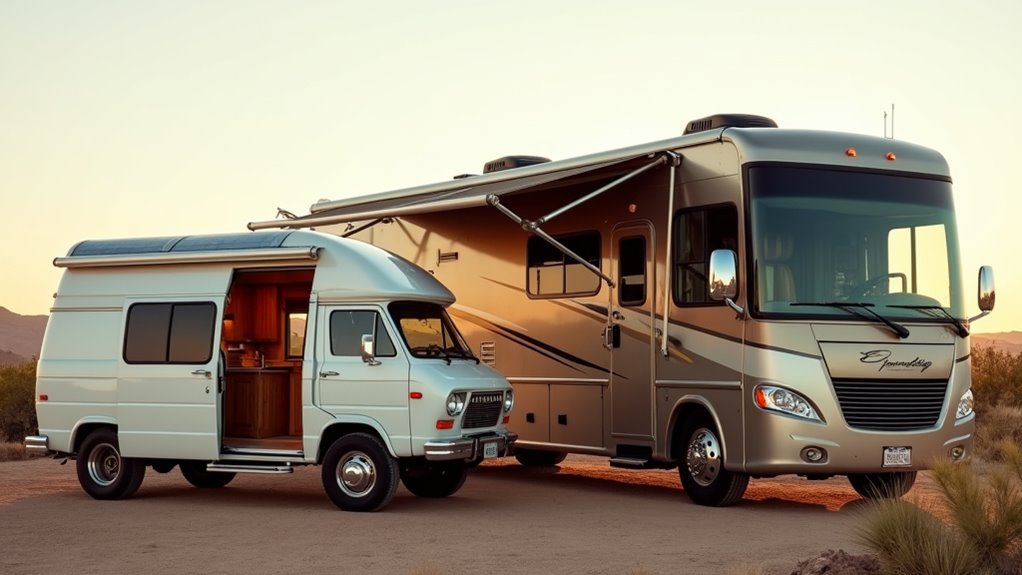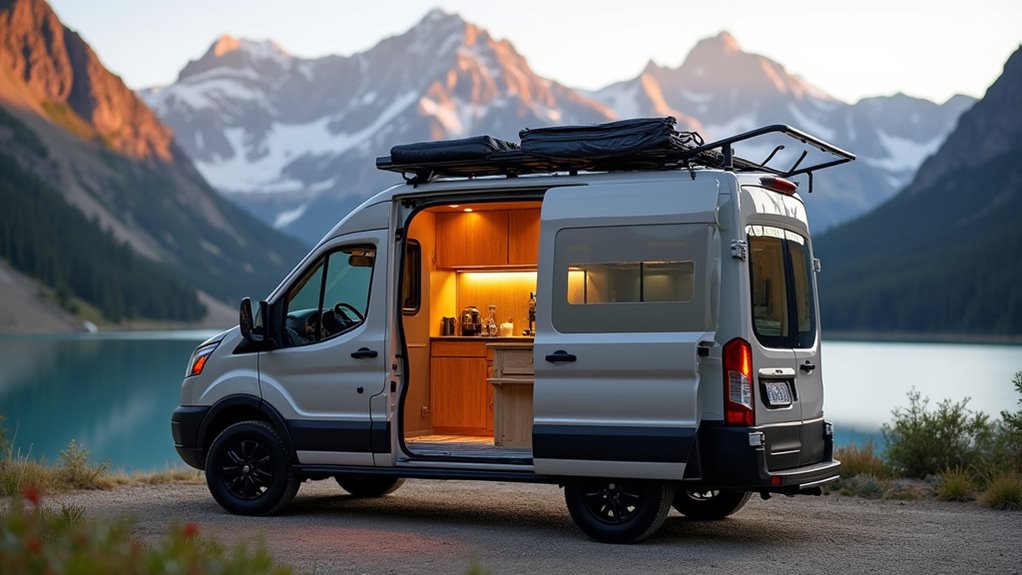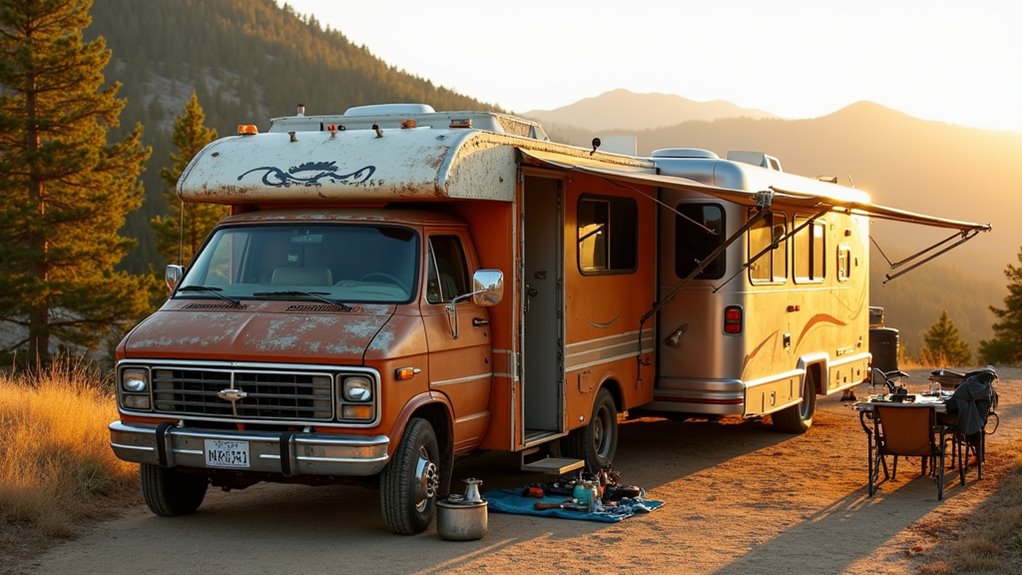Physical Address
304 North Cardinal St.
Dorchester Center, MA 02124
Physical Address
304 North Cardinal St.
Dorchester Center, MA 02124

Most travelers overspend on RVs when van camping delivers identical freedom at half the cost—but one hidden factor changes everything.
You don’t need to break the bank to chase your wanderlust dreams. Van camping has emerged as the smart traveler’s secret weapon, offering all the freedom of RV life without the crushing financial burden. While traditional RVs can drain your savings account faster than gas at a truck stop, a converted van gives you mobility, comfort, and adventure for a fraction of the cost. But here’s what most people don’t realize about the true savings potential.

When you’re weighing your van camping options, the financial picture between converting a van and buying a traditional RV isn’t as straightforward as it might seem.
Converting a cargo van typically costs $15,000-$50,000 depending on your skill level and desired features. You’ll save money doing the work yourself, but factor in tools, mistakes, and time investment.
Traditional RVs range from $40,000-$150,000 new, though used models start around $20,000. However, RVs depreciate rapidly – losing 20% their first year.
Van conversions hold value better since you’re improving a commercial vehicle. Plus, you’ll avoid RV loan interest rates, which run 1-2% higher than auto loans.
Your converted van doubles as daily transportation, eliminating the need for a separate tow vehicle.
If you want to test the waters before committing to either option, consider renting an RV for your first few camping adventures to better understand your space and feature requirements.
Beyond the financial benefits, van camping delivers unmatched freedom to explore places traditional RVs simply can’t reach. Your converted van navigates narrow mountain roads, fits into standard parking spaces, and accesses remote camping spots that bulky RVs can’t handle.
You’ll discover adventures that traditional RV owners miss entirely:
This mobility transforms weekend trips into spontaneous adventures while keeping costs minimal. Van camping offers the perfect stepping stone to experience caravan camping adventures and embrace the outdoor lifestyle that connects you more intimately with nature.

While mobility opens up endless possibilities, your van’s interior design determines whether those adventures feel like camping or comfortable living. You’ll need efficient storage solutions that maximize every inch—think overhead cabinets, under-bed compartments, and multi-purpose furniture.
A reliable electrical system powers your essentials: LED lights, phone chargers, and a small fridge. Install proper insulation to regulate temperature and reduce condensation.
Your sleeping area should accommodate your height comfortably, while a compact kitchen with a two-burner stove and sink handles meal prep. Don’t overlook ventilation fans—they’re vital for air circulation and moisture control.
Water storage tanks, a portable toilet, and privacy curtains complete your mobile home setup without breaking your budget. Since you’ll be relying on natural water sources during extended trips, investing in quality water filters ensures safe drinking water without the expense and weight of constantly buying bottled water.
Now that you know what features make a van livable, choosing the right base vehicle becomes your next major decision—and potentially your biggest expense. Smart shoppers focus on reliable models with strong resale values and affordable parts.
Here are the top budget-friendly options:
You’ll find the best deals on higher-mileage work vans from fleet sales.
Don’t overlook cargo vans with cosmetic issues—ugly paint won’t affect your conversion’s functionality, and you’ll save thousands upfront.
Once you’ve chosen your van, consider exploring adventurous destinations like the US’s top glacier climbing trails to truly test your mobile home’s capabilities.

After you’ve bought your van, the real costs begin piling up through maintenance, repairs, and unexpected breakdowns. You’ll spend $1,500-3,000 annually on routine maintenance like oil changes, brake pads, and tire replacements.
Van ownership’s hidden truth: maintenance costs of $1,500-3,000 yearly will drain your budget faster than you expect.
Older vans demand more attention—expect transmission issues, engine problems, and electrical gremlins that’ll hit your wallet hard.
Budget at least $200 monthly for unexpected repairs. High-mileage vehicles break down more frequently, and finding mechanics willing to work on converted vans can be challenging.
You’ll also face insurance increases, registration fees, and potential storage costs when you’re not traveling.
Smart owners learn basic mechanical skills and keep emergency funds ready. Consider purchasing extended warranties for peace of mind, but read the fine print carefully before committing.
Don’t forget to budget for first aid supplies and insect repellent to handle bites and stings while camping in your van.
You’ll find van camping beats traditional RVs hands down when you’re counting pennies. Your converted van won’t just save you thousands upfront—it’ll keep delivering value as your daily driver and adventure vehicle. Don’t let those fancy RV salesmen convince you otherwise with their snake oil pitches. You’ve got the freedom to park anywhere, maintain affordably, and hit the road whenever wanderlust strikes. Van life’s the smarter financial move for budget-savvy adventurers.